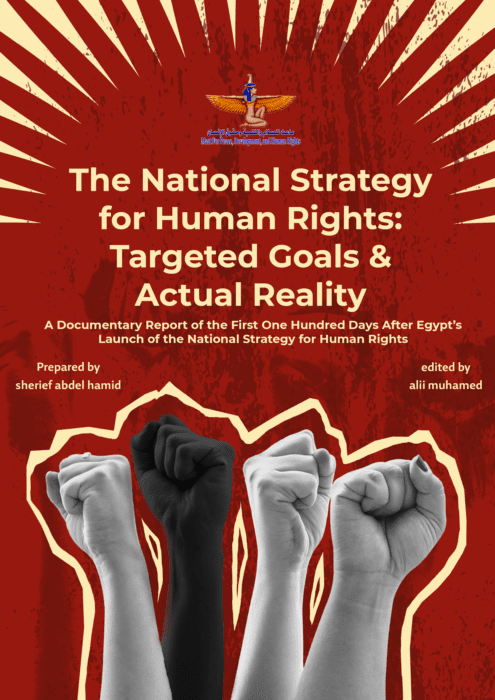One Hundred Days after Egypt’s Launch of the National Strategy for Human Rights, Maat proposes an executive plan of action during 2022
Okeil: The launch of the National Strategy for Human Rights was a unique event
Sherif Abdul-Hamid: The development of action plans to implement the axes of the strategy must be completed as soon as possible
Ali Muhammad: The dialogue between the state and civil society organizations has resulted in positive steps
Maat for Peace, Development, and Human Rights issued a report entitled “The National Strategy for Human Rights: Targeted Objectives & Actual Reality”. It is based on the role of civil society in promoting and spreading a culture of human rights, on the occasion of the 100th day since the launch of the National Human Rights Strategy, which the President of the Republic Abdel Fattah Al-Sisi launched on September 11, 2021. In the report, Maat monitors and analyzes the progress made towards reaching the results targeted by the national strategy through the three operational tracks. Maat presents the challenges facing the strategy's activation, which appeared to the report's authors during the first 100 days of the strategy. Maat also proposed an executive working plan for about 45 targeted goals that could guide the authorities entrusted with activating the strategy during 2022.
The report indicated that the national human rights strategy relies on implementing the vision based on three operational approaches; the legislative approach, the institutional development approach, and the education and capacity-building approach in human rights. Through the previous approach, it is possible to achieve the targeted goals of the four axes of the strategy, which amounted to 226, through the issuance of laws that the strategy considered the Egyptian legislation devoid thereof is a challenge to the human rights advancement in Egypt. In addition to amending other laws, addressing the loopholes in these laws, and repealing laws that obstructed the enjoyment of civil and political rights guaranteed by the constitution and international treaties ratified by Egypt.
The report states the progress in the first 100 days of the national human rights strategy and the efforts related to the three approaches. At the legislative level, many laws were issued aimed at promoting human rights. It included the draft law on the rights of the elderly, amending some provisions of the labor and education law, a draft law to prevent child marriage, and canceling the extension of the state of emergency. About the institutional development, the report monitored state positive steps and measures, the establishment of the Reform and Rehabilitation Center in Wadi al-Natrun, the human rights units in many ministries, and legalizing the conditions of churches. 63 churches and their buildings were legalized recently. The number of churches and buildings approved to regularize their status since the launch and operation of the committee has increased.
Ayman Okeil, an international human rights expert and president of Maat, said that the launch of the National Human Rights Strategy was a unique event, as it is the first comprehensive human rights document in Egypt. It is an affirmation of the political leadership's interest in upgrading and strengthening the human rights and democracy system and respecting international commitments to protect and improve human rights. Okeil stressed that the National Human Rights Strategy considered civil society a partner. So, the strategy was not formulated until dialogue sessions were held in which civil society participated. The President also recommended interpreting the strategy into real measures. He also recommended the government to open the space for civil society and declared 2022 the year of civil society. For the first time, the state works alongside civil society instead of working alone in a cooperative manner. Okeil called for the necessity of working together to implement the strategy and its transition to actual implementation and the implementation of the desired public policies related to human rights. He stressed that this can only be achieved through a societal awareness of these rights and how to claim and absorb them, and public officials in charge of implementing laws are sufficiently aware of the results targeted by the strategy.
For his part, Sherif Abdul-Hamid, director of the Research and Studies Unit at Maat, said that the national strategy for human rights addressed urgent controversial, especially among the international community in recent years. Abdul-Hamid called for accelerating the development of executive action plans to achieve the targeted results of the National Human Rights Strategy, which included 226 targeted results. Abdul-Hamid indicated that by dividing these results over the time frame set by the strategy, which is estimated at five years, we find that 45 target results must be achieved every year. It is divided among the implementation tracks identified by the strategy, which are the legislative development, institutional development, and capacity building in human rights. Maat developed an executive proposal for 45 goals that must be worked on and achieved during 2022.
In the same context, Ali Muhammad, a researcher at Maat, said that repealing Law No. 70 of 2017 improved the relationship between the state and civil society. The state made a dialogue with civil society organizations, which resulted in many positive steps. It includes the issuance of the new Associations Law, ending the foreign funding issue, launching the National Human Rights Strategy, and declaring 2022 the year of civil society.

 |
 |
shortlink: https://maatpeace.org/en/?p=34371












